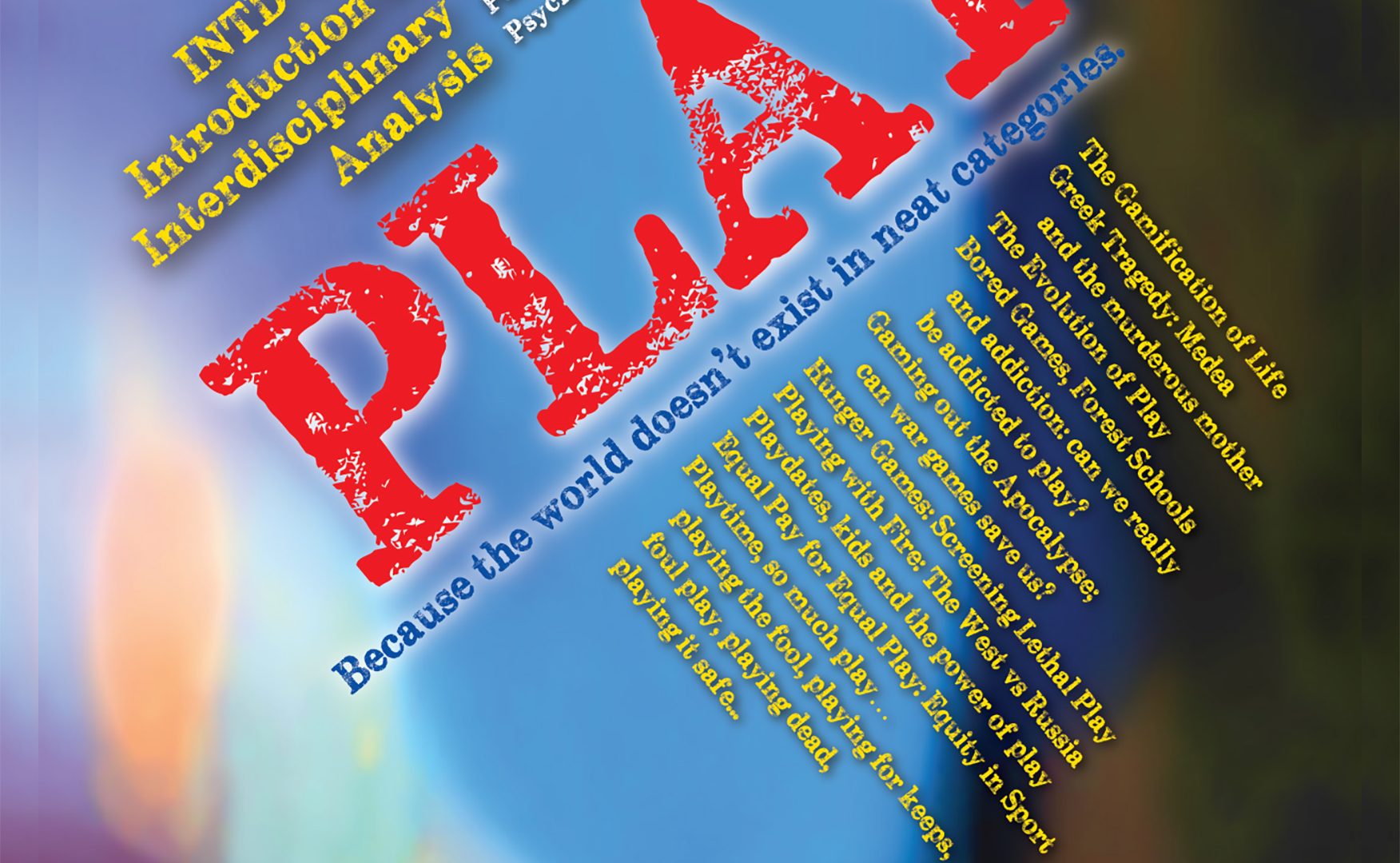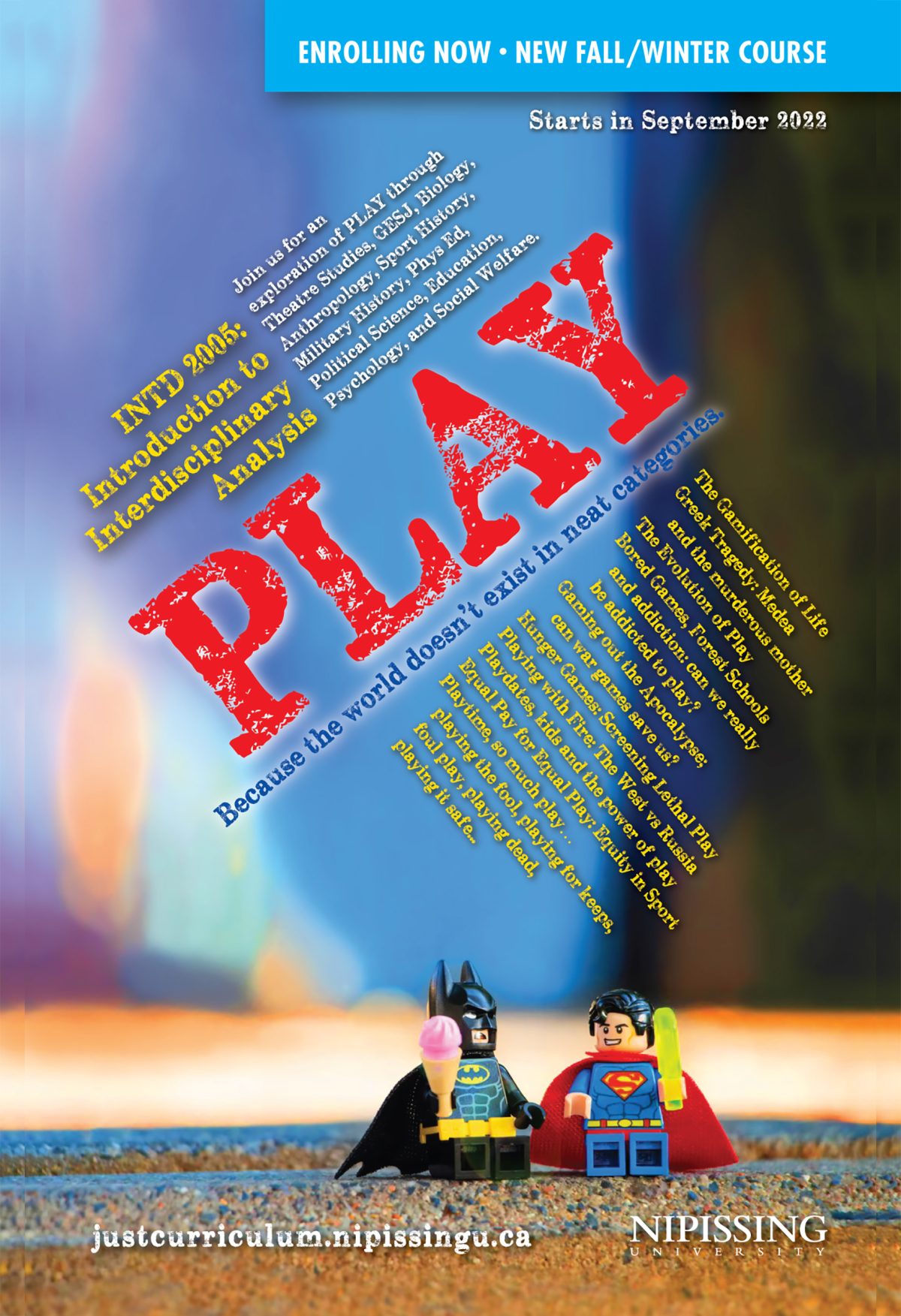PLAY
Because the World Doesn’t Exist in Neat Categories….
After two years of a global pandemic it’s definitely time to play! Join us for the 11th INTD concept course where we will be exploring the best and maybe even the worst of play. Can play be addictive? What does it mean to play war games? What is play anyway? We know animals play but when they play we call it ‘training for life’, we call it ‘evolutionary’. Is it the same for humans? How about plays? Funny word for theatre really. Here play becomes something more like pretend than practice. In this case we will tackle one of the darkest and most tragic of the Greek classics – Medea – a woman whose apparent desire for power exceeded even her own wildest expectations. Five centuries after it was written we still have much to learn from this ‘play’ and indeed from all the ways in which play will accompany us throughout the year. Once again, we have an amazing line up of profs from Nipissing and beyond who will be joining us as we tease out connections between seemingly radically different ideas about just what we mean when we invoke the idea of play and as we practice doing this, playing, in the company of others.
Michelann Parr Education
PLAY: It’s more than just fun!
What is play? What does it look, sound, and feel like? If play is child’s work, how do we conceive of play across the lifespan? What purposes does play serve? Does it need to have a purpose? Come play with us! Bring an open and inquiring mind to explore and discover key theoretical concepts that will change the way you see play in the world, both for yourself and others. Play is powerful… so much more than just fun!!!
Paul Monaghan Classics
Medea – A Killer Play
We are reading Medea together in this class. It’s one of the most famous of the ancient Greek tragedies, written by Euripides and based on the myth of Jason and Medea. It’s a page turner, both the oldest of stories and yet still shocking. Spoiler alert: Medea is the wife of Jason (he’s the Jason of the Argonauts Jason) and he leaves her for a younger woman. She is angry and powerful and takes vengeance in a way that leaves audiences breathless. Not only does she exact revenge by killing Jason’s new young wife, she also kills his children, who are also hers! We will spend the class reading this play together and the following Seminar working out what on earth was going on in this ‘play’.
Pat Maher Dean of Teaching and Learning
Outdoor Play: Trials and Tribulation, Conundrums and Celebrations
Outdoor play is not a new idea; 40 years ago (in my childhood), it is just what was done – you got thrown outside for the day or after school and just came home for meals. Today’s children have a screen time “problem”, and as Richard Louv says, a “nature deficit disorder”. This class will unpack outdoor play as a concept – look at it in relation to other concepts: risky play, loose parts play, etc for children. We will also discuss outdoor play across the lifespan, and in relation to outdoor learning and outdoor teaching. Come prepared to go outside for a portion of the class – no matter what the weather is 😊
Renee Valiquette & Sal Renshaw Gender Equality & Social Justice
Playing with Gender
Increasingly we live in a word where traditional categories of gender are up for debate but also for experimentation and play. While the binary sex/gender distinction also holds sway in many contexts Western Cultures are more accepting at least of the idea that gender might be more fluid than we have been led to believe. In this class, we will start with an engagement with the work of Kathryn Bond Stockton, Professor of English and Dean of the School for Cultural & Social Transformation at the University of Utah whose appearance on The Ezra Klein Show Podcast will form the stepping off point for our exploration of the ideas around playing with gender. The episode is called “Gender is Complicated for All of US. Let’s Talk about it”.
Kevin Wamsley Nipissing University President & Professor of Physical Education focused on Sport History History
Unplay: A Critical Conversation about Sport and Play
In this class Kevin, Renee and Sal will explore the structural foundations of professional and competitive sport in the context of both historical and current applications. We will raise questions about how sport reproduces complex relations of power – both good and bad – with a key goal of inspiring intellectual curiosity around taken for granted assumptions about what sport is and can be. We anticipate that this will be a broad ranging conversation covering topics like the Olympics (Kevin’s area of expertise and research), the commercialization of sport, cold war politics, gender, the historical and cultural origins of sport, racial justice and violence amongst many other topics.
Stephen Connor History
Serious Play: Conflict Simulation and History
War gaming, as a way to recollect and teach history sits at the centre of the science and art of the Western way of war. Games and simulations have long been an integral part of military training and preparation. In this class we will explore the history of conflict simulation and we will engage in an immersive exercise where we play what is known as a Matrix Game – one of the many games used by militaries in creating preparedness. Matrix Games have also been used by social service agencies and they have been used in psychotherapy and in education to teach history and creative writing.
Wendy Peters Gender Equality & Social Justice
Playing Up “Authentic” White Femininity in The Hunger Games
The 2012 film The Hunger Games “plays” with the source material—dystopian novels written by author Suzanne Collins—in ways that arguably centre Whiteness and feature racist tropes, including sacrificial, sidekick and servant roles for Black and multiracial characters. People of colour are framed as “good,” but they are also in inherently supporting roles, there to establish the character development of the White hero. While certain White feminine subjects are framed as excessive, too staged, too performative and inherently shallow (e.g. Effie Trinket), the White feminine protagonist is framed onscreen as authentic, natural, relatable, maternal, caring and noble. Via scholarly literature on reality TV, surveillance, authenticity, Whiteness and post-race discourse, we will consider how “authenticity” is constructed and privileged onscreen as the hero “performs not-performing.” Arguably, the film “plays” with being “progressive” by having a racially diverse cast and a teen girl as its hero, while also recentering and flattering “authentic,” White, maternal and “beautiful” femininity.
Leslie Shayer Math & Computer Science UBC Okanagan
Math Anxiety and how to Play with Numbers
So many people say they ‘hate math’ and that math is about as far from play as anyone can imagine. In this class, we are going to reflect both on this idea, that math is hard, and that only some people can ‘do math’ and we’ll consider the many ways in which math permeates all our lives. We are excited to welcome Leslie Shayer who has been a Professor of Mathematics and Statistics at Okanagan College at UBC since 2006 where she has been teaching math education to those who love as well as those who hate math. She is also a student in the Doctor of Philosophy (PhD) in the Interdisciplinary Graduate Studies program where her research focuses on the impact of contemplative pedagogy on math anxiety in post-secondary education.
Sarah Winters & Gyllie Phillips English Studies
Playing with Language – Enter the Jabberwocky
Poetry plays with sounds, words, and ideas. This lecture covers the play of poetry from the poetry of the playground, such of “Ring-a-Ring-a-Rosie” and “London Bridge is Falling Down” to the poetry of the avant-garde Dada-ists. Students play to poetry and with poetry.
Jonathon Collins Registered Psychotherapist – Community Counselling
Gaming Additions – The Darker Side of Play
Not all play is harmless and fun. Our increasingly complex, often addictive relationships with things like social media and gaming are revealing just how disruptive and sometime harmful ‘play’ can be. Game and social media designers are more than aware of the ways in which our brain chemistry, especially our pleasure chemistry, makes us vulnerable to addiction. Hijacking this reward system turns out to be lucrative for business but not always equally so for the rest of us. In this class we will explore the darker side of play with Jonathon Collins, a psychotherapist who treats clients with various kinds of addictions including social media and gaming.

